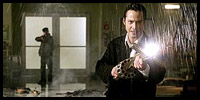
 |
|
Constantine (2005) Cast: Keanu Reeves, Rachel Weisz, Shia LaBeouf, Djimon Hounsou, Tilda Swinton, Gavin Rossdale, Peter Stormare, Pruitt Taylor Vince, Max Baker, Jesse Ramirez, Jose Zuniga, Francis Guinan, April Grace 2005 – 121 minutes Rated: Reviewed by Dustin Putman, February 9, 2005.  Based on the DC/Vertigo comic book entitled "Hellblazer," "Constantine" is a macabre, handsomely mounted production that plays like a curious cross-stitch of 1998's "Blade," 1973's "The Exorcist," and 1997's "Devil's Advocate," the latter coincidentally also starring Keanu Reeves. Alas, all of those pictures were superior. Directed by music video director Francis Lawrence (making his big-screen debut), the CGI-heavy "Constantine" opens with a creepily enthralling initial scenario—that the world is being secretly overrun by demonic and angelic human half-breeds—but eventually bogs itself down with an overload of half-baked ideas and curt plot developments that don't form a coherent enough whole.
Based on the DC/Vertigo comic book entitled "Hellblazer," "Constantine" is a macabre, handsomely mounted production that plays like a curious cross-stitch of 1998's "Blade," 1973's "The Exorcist," and 1997's "Devil's Advocate," the latter coincidentally also starring Keanu Reeves. Alas, all of those pictures were superior. Directed by music video director Francis Lawrence (making his big-screen debut), the CGI-heavy "Constantine" opens with a creepily enthralling initial scenario—that the world is being secretly overrun by demonic and angelic human half-breeds—but eventually bogs itself down with an overload of half-baked ideas and curt plot developments that don't form a coherent enough whole.
 John Constantine (Keanu Reeves) is a brooding private investigator of the occult who was born with a gift of seeing the otherworldly evil hiding within the people around him—beings whom, to everyone else, look like average members of society. In an attempt to spiritually redeem himself after a failed suicide attempt as a young boy, Constantine has devoted his adult life to exorcising demons and fighting the forces of darkness. To make matters worse, he is a longtime chain-smoker recently diagnosed with terminal lung cancer whose time is running out.
John Constantine (Keanu Reeves) is a brooding private investigator of the occult who was born with a gift of seeing the otherworldly evil hiding within the people around him—beings whom, to everyone else, look like average members of society. In an attempt to spiritually redeem himself after a failed suicide attempt as a young boy, Constantine has devoted his adult life to exorcising demons and fighting the forces of darkness. To make matters worse, he is a longtime chain-smoker recently diagnosed with terminal lung cancer whose time is running out.
 While performing an exorcism on a teenage girl, Constantine just barely is able to stop a full-blown demon from breaking through the barrier between Hell and Earth, an occurrence he has been told could never happen. Just as he begins investigating this potentially apocalyptic matter, Constantine is sought out by Angela Dodson (Rachel Weisz), a police detective whose twin sister, Isabel, is suspected of committing suicide. Angela, however, knows her sister wouldn't have killed herself, despite what the video recordings show. Aided by a vision that brings her to him, Angela believes Constantine may be her only hope in finding out the truth and saving her sister's damned soul.
While performing an exorcism on a teenage girl, Constantine just barely is able to stop a full-blown demon from breaking through the barrier between Hell and Earth, an occurrence he has been told could never happen. Just as he begins investigating this potentially apocalyptic matter, Constantine is sought out by Angela Dodson (Rachel Weisz), a police detective whose twin sister, Isabel, is suspected of committing suicide. Angela, however, knows her sister wouldn't have killed herself, despite what the video recordings show. Aided by a vision that brings her to him, Angela believes Constantine may be her only hope in finding out the truth and saving her sister's damned soul.
 This would seem to be more than enough plot for any two-hour horror film, but "Constantine" is stuffed with several other subplots, including the business of the Spear of Destiny, a knife found in Mexico that instantly possesses its owner and has the power of releasing Hell onto the living world. There is also a black man named Midnite (Djimon Hounsou), a sort-of ally with Constantine who has a chair able to mentally transport the sitter to Hades. Then there is Balthazar (Gavin Rossdale), a demon half-breed who is Satan's helper. There is also an androgynous angel half-breed named Gabriel (Tilda Swinton) whose real intentions are left to be discovered, and Chas (Shia LaBeouf), who is Constantine's teenage sidekick. There is more, still, where that came from, and although the various storylines and supporting characters are intended to cohesively join together, they never do. Simply put, the screenplay by Kevin Brodbin and Frank Cappello has bitten off more than it chew, unable to satisfactorily develop its premise or do justice to its ambitions.
This would seem to be more than enough plot for any two-hour horror film, but "Constantine" is stuffed with several other subplots, including the business of the Spear of Destiny, a knife found in Mexico that instantly possesses its owner and has the power of releasing Hell onto the living world. There is also a black man named Midnite (Djimon Hounsou), a sort-of ally with Constantine who has a chair able to mentally transport the sitter to Hades. Then there is Balthazar (Gavin Rossdale), a demon half-breed who is Satan's helper. There is also an androgynous angel half-breed named Gabriel (Tilda Swinton) whose real intentions are left to be discovered, and Chas (Shia LaBeouf), who is Constantine's teenage sidekick. There is more, still, where that came from, and although the various storylines and supporting characters are intended to cohesively join together, they never do. Simply put, the screenplay by Kevin Brodbin and Frank Cappello has bitten off more than it chew, unable to satisfactorily develop its premise or do justice to its ambitions.
 For quite a while, "Constantine" enraptures one's attention with the promise of paying off the seeming hodgepodge of ideas on display. There are a fair share of ghastly, mind-bending visuals to be impressed by, including a frightening glimpse of Hell, a violent attack on Constantine by a demon made of insects, a jolting scene set on a city bus, and a process in which characters are able to stop time around them. The way in which certain characters are yanked violently backwards by an invisible hand, unfortunately, was just seen, and to startlingly better effect, in 2004's "The Forgotten." Ultimately, when the expected catharsis does not arrive, the film introducing even more abrupt plot turns up until the very end, each one needlessly overcomplicating things and coming off as if they could have been thought up on the day of filming, the viewer can virtually detect their own involvement evaporating before them. The protracted finale, meant to be charged with emotion, suspense, and complexity, muddily spins its wheels to such a degree that the intended outcome is stunted and disappointingly unmoving.
For quite a while, "Constantine" enraptures one's attention with the promise of paying off the seeming hodgepodge of ideas on display. There are a fair share of ghastly, mind-bending visuals to be impressed by, including a frightening glimpse of Hell, a violent attack on Constantine by a demon made of insects, a jolting scene set on a city bus, and a process in which characters are able to stop time around them. The way in which certain characters are yanked violently backwards by an invisible hand, unfortunately, was just seen, and to startlingly better effect, in 2004's "The Forgotten." Ultimately, when the expected catharsis does not arrive, the film introducing even more abrupt plot turns up until the very end, each one needlessly overcomplicating things and coming off as if they could have been thought up on the day of filming, the viewer can virtually detect their own involvement evaporating before them. The protracted finale, meant to be charged with emotion, suspense, and complexity, muddily spins its wheels to such a degree that the intended outcome is stunted and disappointingly unmoving.
 As John Constantine, Keanu Reeves (2003's "The Matrix Revolutions") carries the movie with a sullen, often silent intensity. With the knowledge that his life is almost over, but without the foresight to know if he has done what is necessary to be forgiven by a higher power for his past sins, Reeves capably embodies Constantine's tortured frame of mind. Paired up for the second time with Reeves following the 1996 dud, "Chain Reaction," Rachel Weisz (2003's "Runaway Jury") transcends her stock role half of the time with some stirring line deliveries, but isn't given enough to do to be memorable. As he did in 2004's "I, Robot," Shia LaBeouf awkwardly sticks out like a swollen thumb in the throwaway part of Constantine's friend, Chas. Mostly, Constantine treats him like more of a bother than a confidante, making one wonder why he couldn't have been completely excised from the script. Making the most positive impression is Tilda Swinton (2002's "Adaptation"), ethereal and mesmerizing as winged angel half-breed Gabriel. Swinton brings such depth and sorrow in her fleeting time onscreen that a stronger film could have probably been made with her character as the main figure.
As John Constantine, Keanu Reeves (2003's "The Matrix Revolutions") carries the movie with a sullen, often silent intensity. With the knowledge that his life is almost over, but without the foresight to know if he has done what is necessary to be forgiven by a higher power for his past sins, Reeves capably embodies Constantine's tortured frame of mind. Paired up for the second time with Reeves following the 1996 dud, "Chain Reaction," Rachel Weisz (2003's "Runaway Jury") transcends her stock role half of the time with some stirring line deliveries, but isn't given enough to do to be memorable. As he did in 2004's "I, Robot," Shia LaBeouf awkwardly sticks out like a swollen thumb in the throwaway part of Constantine's friend, Chas. Mostly, Constantine treats him like more of a bother than a confidante, making one wonder why he couldn't have been completely excised from the script. Making the most positive impression is Tilda Swinton (2002's "Adaptation"), ethereal and mesmerizing as winged angel half-breed Gabriel. Swinton brings such depth and sorrow in her fleeting time onscreen that a stronger film could have probably been made with her character as the main figure.
 Technically elegant and appropriately dark in tone, "Constantine" is a good-looking, but decidedly hollow motion picture. Director Francis Lawrence misses the opportunity to explore his evocative central conceits by attempting to do too many other things at once, and failing. There are a couple solid jump-in-your-seat moments—they at least work better than those in the worthless, recent "Boogeyman"—but, because of the film's lack of focus, nothing particularly scary on a long-term primal level. Perhaps due to Lawrence's reliance on CGI effects, the characters also get lost in the shuffle, making the climactic sacrifice one of them makes worthy of but a shrug. Ironically, too much cinematic aspiration becomes a detriment to the finished product, which called for a more simplistic approach to the material or, at least, a tighter screenplay. In the case of "Constantine," less would have certainly been more.
Technically elegant and appropriately dark in tone, "Constantine" is a good-looking, but decidedly hollow motion picture. Director Francis Lawrence misses the opportunity to explore his evocative central conceits by attempting to do too many other things at once, and failing. There are a couple solid jump-in-your-seat moments—they at least work better than those in the worthless, recent "Boogeyman"—but, because of the film's lack of focus, nothing particularly scary on a long-term primal level. Perhaps due to Lawrence's reliance on CGI effects, the characters also get lost in the shuffle, making the climactic sacrifice one of them makes worthy of but a shrug. Ironically, too much cinematic aspiration becomes a detriment to the finished product, which called for a more simplistic approach to the material or, at least, a tighter screenplay. In the case of "Constantine," less would have certainly been more.
|
© 2008 by Dustin Putman |














